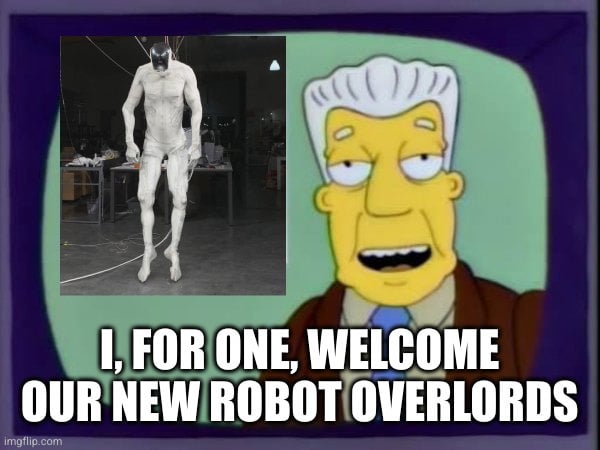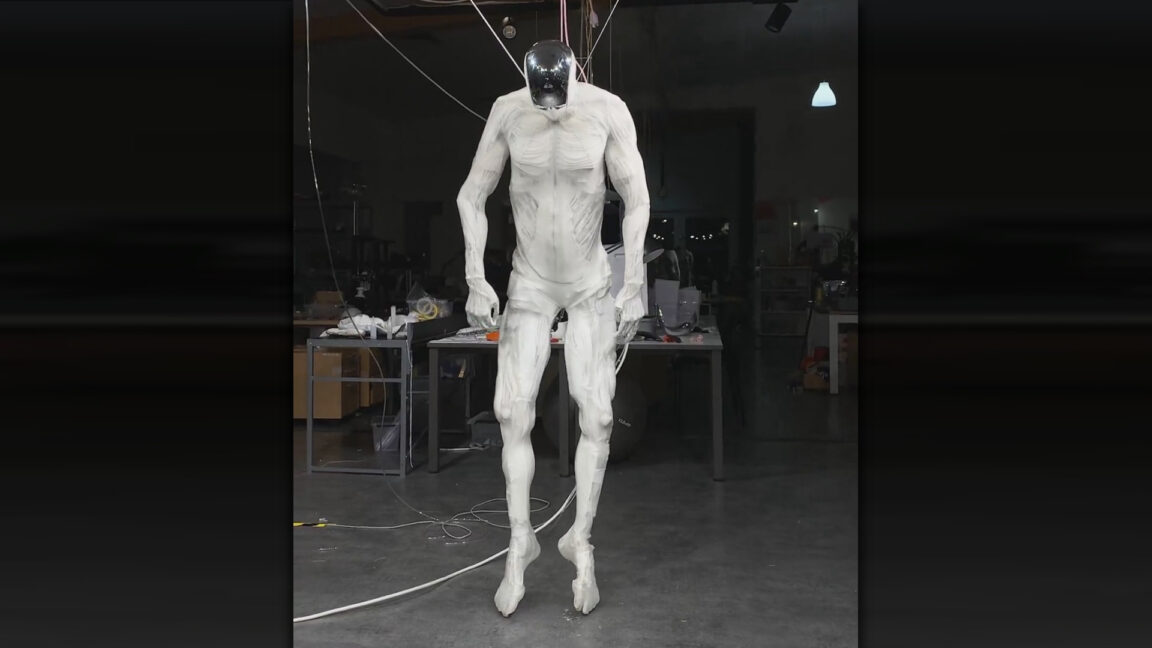Terrifying
Can’t wait to find out it was just a guy in a suit.
Or a half of a man in case of torso.
lol fml


This kind of thing could actually be really beneficial for prosthetics. If we can make a robot that functions as close as possible to a human body at human size, then we can chunk it up to make prosthetics that work like your original limbs and are easy to adapt to.
Science isn’t about why, it’s about why not!
Now we can have people twitching while hanging from the ceiling without having to hunt them in back alleys! Progress!
Think of the savings in cleaning supplies!
“At long last, we have created the Torment Nexus from classic sci-fi novel Don’t Create The Torment Nexus”
Now have it stand on the ground without supports.
Great, soon I won’t even know if someone is human in real life as well. Youre all bots.
Nonsense, fellow human! I am sure you—l mean we—have nothing to fear!
not creepy at all… hey what’s that flash disk lying on the table
You know, it was super creepy until I got to the video without a soundtrack and found out they sound like farts.
“Like human”
Yes, like a very, very robotic, unnatural human.
Almost like a robot.how do you know that robot is an autie??
Leave it to humans to build a robot for the purpose of lynching it.
We don’t deserve Earth.

Data? Is that you?

I see they are prepping for the live action QWOP movie.
Maybe a weird aside, but what does this mean?
pushing fluid at 40 standard liters per minute.
Are there “liters” other than the 10cm x 10cm x 10cm definition?
You mean the flow rate of a volume of liquid? What are you confused about exactly?
They’re asking why it’s “standard litres per minute”, instead of just “litres per minute”
Oh, well yeah Standard liters per minute or SLM, specifically refers to flow rates measured in the U.S.
So the “other” measurement would evidently be Europes “Normal liters per minute”.
What the difference is, I couldn’t tell you.
Volume changes based on temperature and pressure. So when we reference volume measurements like for flow rates, we typically do the math to adjust those to standard temperature and pressure. Standard pressure is 1 atm but standard temperature varies based on who you’re talking to because of competing standards. It’s usually 25 C or 20 C.
When we want to reference the non temperature and pressure corrected volume, we append actual to it so that people know what the measurement is. Some people don’t do that and that causes confusion for others using their work if the reading is standard or actual.
To totally confuse you: The USA uses the “standard litre” while Europe uses “normal litre”:
Thanks, you succeeded hahaha.
From what I’m reading there this is a measure of mass flow rate of gas, expressed as volume per minute at some standard volume and pressure. Which makes some sense, you need those two parameters to be fixed so you can measure mass by volume.
And then I realized the OP article uses it for a
fluidliquid 😂Aren’t fluids and gases kinda the same thing in some aspects, just different mass? (Clearly, not a scientist).
A fluid is anything that flows. A box of marbles is a fluid.
First of all: Sorry, I made a mistake yesterday. I ment to say liquid but translated it wrong in my head
Now to your question, they are similar in some aspects, that’s what makes gasses and liquids both be considered fluids, so fluid dynamics apply to both for example.
The difference is how much the molecules in the liquid or gas interact: A lot in the liquid, not significantly in most gasses under standard conditions.
And the things is, the SLPM measure apparently relies on a characteristic of ideal gasses, that one mol of gas particles under standard conditions always takes a fixed volume 22.41 l. So now I’m confused why they would use it for hydraulic fluid, which sounds like a liquid to me.
The major difference is compressibility. Generally, liquids are practically incompressible. So just knowing the mass flow rate and density, volume flow rate can be calculated. It’s not so simple for gases











